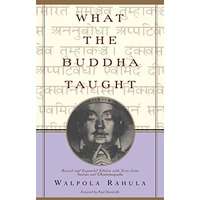What the Buddha Taught by Walpola Rahula EPUB & PDF – eBook Details Online
- Author: Walpola Rahula
- Language: English
- Genre: Religious Reference
- Format: PDF / EPUB
- Size: 2 MB
- Price: Free
THE BUDDHIST ATTITUDE OF MIND
Among the founders of religions the Buddha (if we are permitted to call him
the founder of a religion in the popular sense of the term) was the only
teacher who did not claim to be other than a human being, pure and simple.
Other teachers were either God, or his incarnations in different forms, or
inspired by him. The Buddha was not only a human being; he claimed no
inspiration from any god or external power either.
He attributed all his
realization, attainments and achievements to human endeavour and human
intelligence. A man and only a man can become a Buddha. Every man has
within himself the potentiality of becoming a Buddha, if he so wills it and
endeavours. We can call the Buddha a man par excellence. He was so perfect
in his ‘humanness’ that he came to be regarded later in popular religion
almost as ‘super-human’.
Man’s position, according to Buddhism, is supreme. Man is his own
master, and there is no higher being or power that sits in judgment over his
destiny.
‘One is one’s own refuge, who else could be the refuge?’
1 said the
Buddha. He admonished his disciples to ‘be a refuge to themselves’, and
never to seek refuge in or help from anybody else.
2 He taught, encouraged
and stimulated each person to develop himself and to work out his own
emancipation, for man has the power to liberate himself from all bondage
through his own personal effort and intelligence. The Buddha says: ‘You
should do your work, for the Tathāgatas
3 only teach the way.’
4
If the Buddha
is to be called a ‘saviour’ at all, it is only in the sense that he discovered and
showed the Path to Liberation, Nirvāṇa. But we must tread the Path
ourselves.
It is on this principle of individual responsibility that the Buddha allows
freedom to his disciples. In the Mabāparinibbāna-sutta the Buddha says that
he never thought of controlling the Sangba (Order of Monks)
1
, nor did he
want the Sangha to depend on him. He said that there was no esoteric
doctrine in his teaching, nothing hidden in the ‘closed-fist of the teacher’
(ācariya-muṭṭhi), or to put it in other words, there never was anything ‘up his
sleeve’.
2
The freedom of thought allowed by the Buddha is unheard of elsewhere in
the history of religions. This freedom is necessary because, according to the
Buddha, man’s emancipation depends on his own realization of Truth, and
not on the benevolent grace of a god or any external power as a reward for
his obedient good behaviour.
The Buddha once visited a small town called Kesaputta in the kingdom of
Kosala. The inhabitants of this town were known by the common name
Kālāma. When they heard that the Buddha was in their town, the Kālāmas
paid him a visit, and told him:
For More Read Download This Book
EPUB



